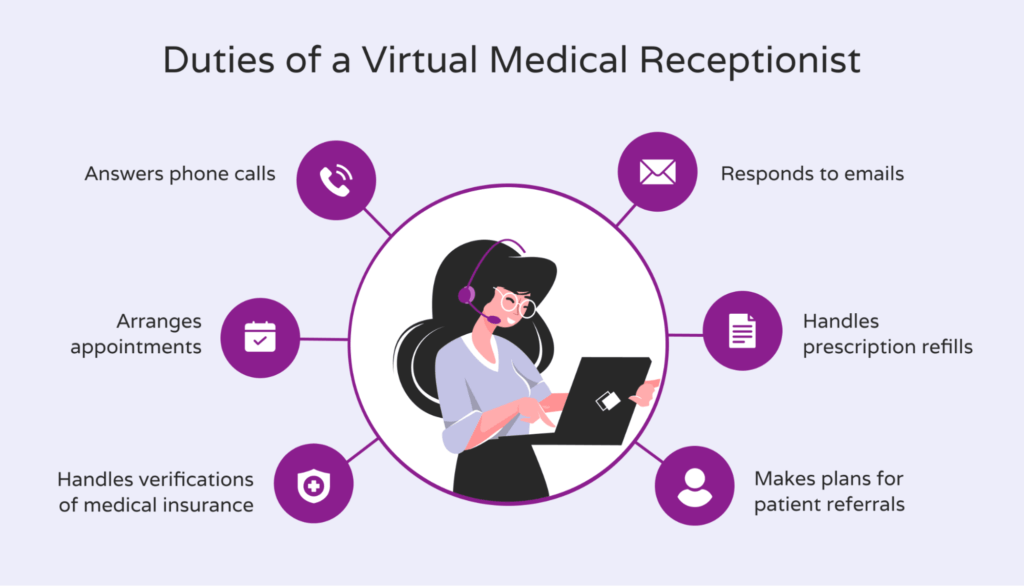Thinking of hiring a medical assistant for your practice?
Knowing what skills you need to look for in an assistant can be of great help in choosing the right candidate for the job. The more skills they have, the better they’ll be able to help your practice grow.
This article will cover the top 10 medical assistant skills you should look for when hiring an assistant. Inside, you’ll learn the duties medical assistants perform and how hiring one benefits your business.
What is a medical assistant?
A medical assistant is a healthcare professional who works directly with doctors and other healthcare practitioners at doctor’s offices, clinics, etc. They’re responsible for helping doctors and clients with anything they may need to have a more seamless experience.
As the largest segment of our population ages, employment of medical assistants is expected to increase by 16% from 2021 to 2031. More patients means more caregivers.
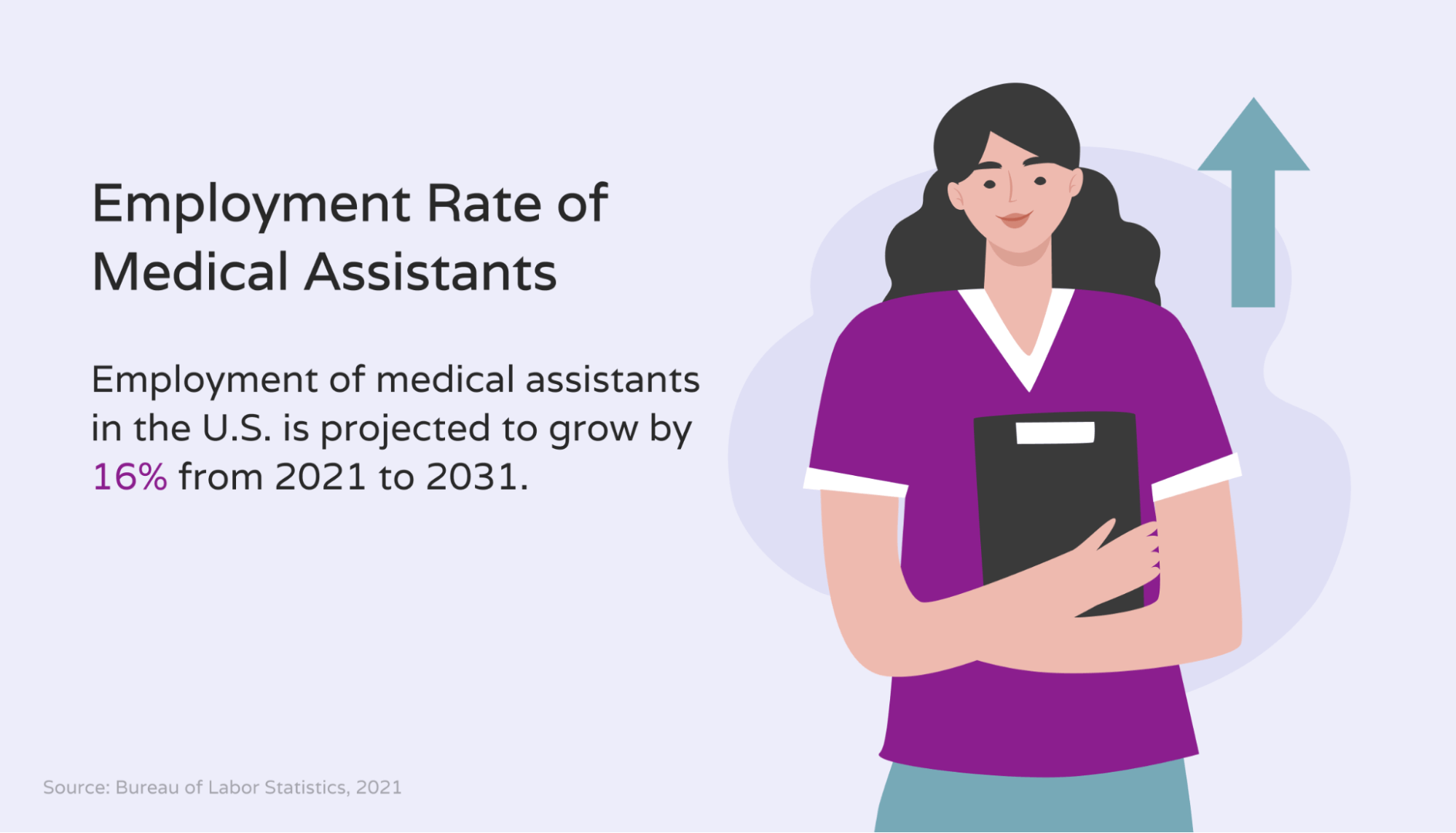
This steep increase in the employment rate of medical assistants indicates that these professionals are more vital to the success of medical practices than ever before.
Not only do they ensure better experiences, but they also help with the flow of operations and the implementation of policies.
Medical assistant responsibilities
Medical assistants can perform a broad range of duties, depending on their employer and the facility they work in. Here are some of their most common tasks:
Record patient medical histories
Medical assistants are responsible for recording patients’ medical histories, lab tests, vitals, and more in the patient’s medical records (EMRs) so that the doctor has all the information necessary to treat the patient. Per HIPAA, these records must be kept confidential.
Provide patient education
Medical assistants are responsible for providing patient education. This includes aftercare, medications, how they should move their bodies after treatment, etc. Patient education can be given in person or in the form of written communication over email.
Prepare treatment rooms
Medical assistants need to prepare treatment and operation rooms by sterilizing medical equipment, making sure that all supplies are there, and more.
In addition to preparing the room, they may need to assist the doctor during patient examinations and procedures.
Administrative duties
Many medical assistants also perform a wide range of administrative duties, such as:
- Answer phone calls and emails: Not only do they need to answer incoming phone calls and emails but they are also required to make outbound calls. During these calls, they need to answer questions that the patient may have to the best of their ability.
- Run errands: They may also need to run errands, such as getting coffee and buying birthday cakes for staff members.
- Maintain office supplies: It’s vital that stock doesn’t run out. As such, medical assistants need to keep an eye on stock levels and purchase supplies in advance.
- Schedule appointments: Clients may call in to book appointments or ask for bookings online. Medical assistants need to help them make these bookings, and they should also help them if they need to reschedule.
- File documents: They need to keep documents up to date with the latest patient information. Afterward, these documents need to be imported into the practice’s database for easy access.
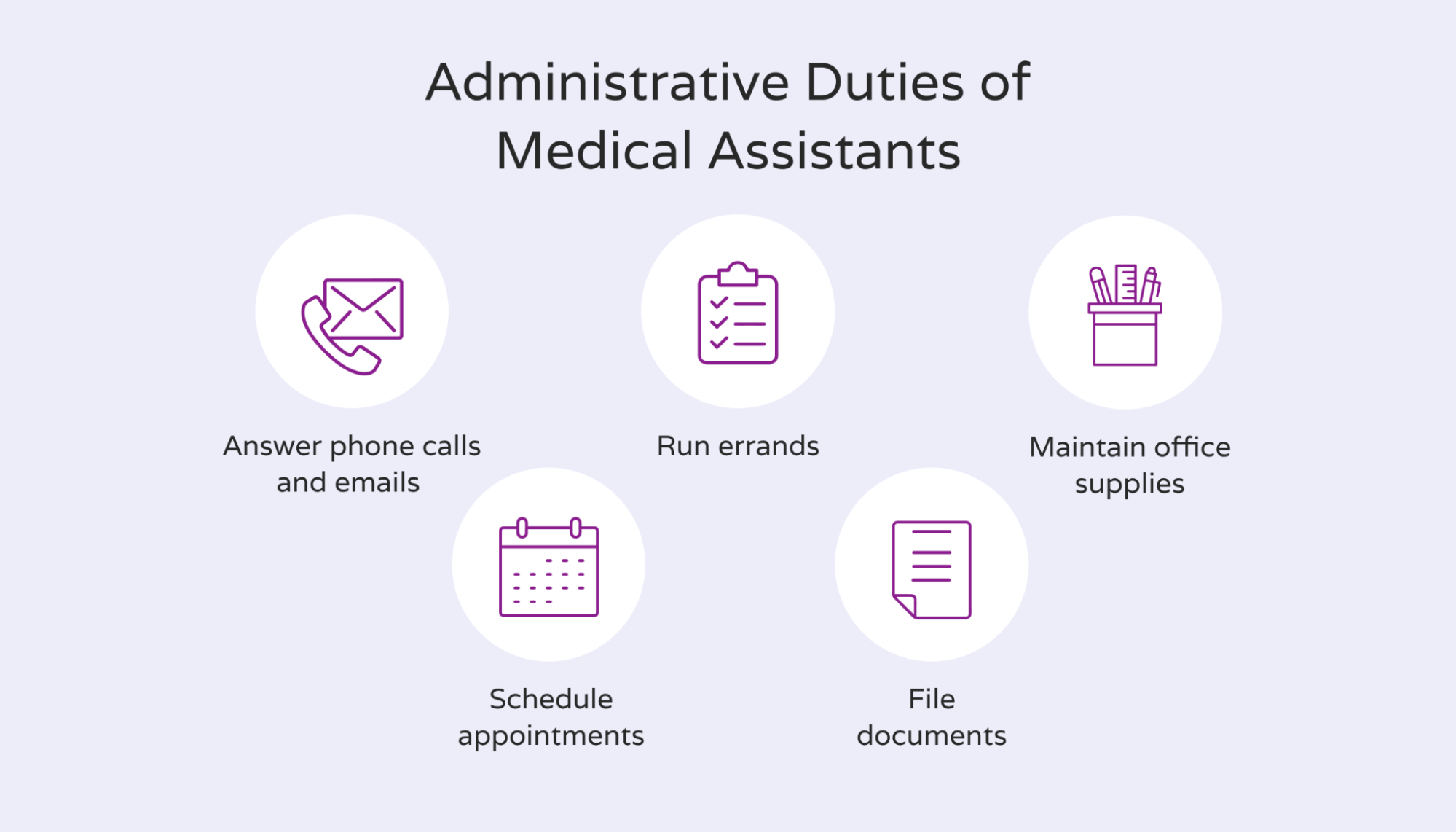
A virtual medical assistant can perform many of the above-mentioned skills. Hire a virtual medical assistant from Hello Rache.
Top medical assistant skills to look for when hiring an assistant
Medical assistants need a range of skills. Here’s a list of some of the most important skills that you should look for when hiring one for your practice.
1. Administrative skills
During a typical day, medical assistants may need to perform various administrative tasks. These include answering calls, talking to suppliers, and greeting patients. As such, they need to be able to perform these tasks with ease.
Alongside being able to perform these duties, medical assistants need to be able to prioritize them to ensure that everything gets done on time. Organizational skills come in handy here.
2. Time management
A good assistant will be able to manage their own and their employer’s time effectively. For example, they may need to schedule the doctor’s meetings with stakeholders while managing their own schedule, too.
Their time management skills will have a direct impact on the operations of the medical practice and will help keep the workplace running smoothly.
3. Customer service
Patients select their practitioners based on quality patient care and service. As such, medical assistants need to have great customer service skills.
Whether that be talking to customers in person, over the phone, or via email, medical assistants always need to be friendly and should always take the initiative to follow up.
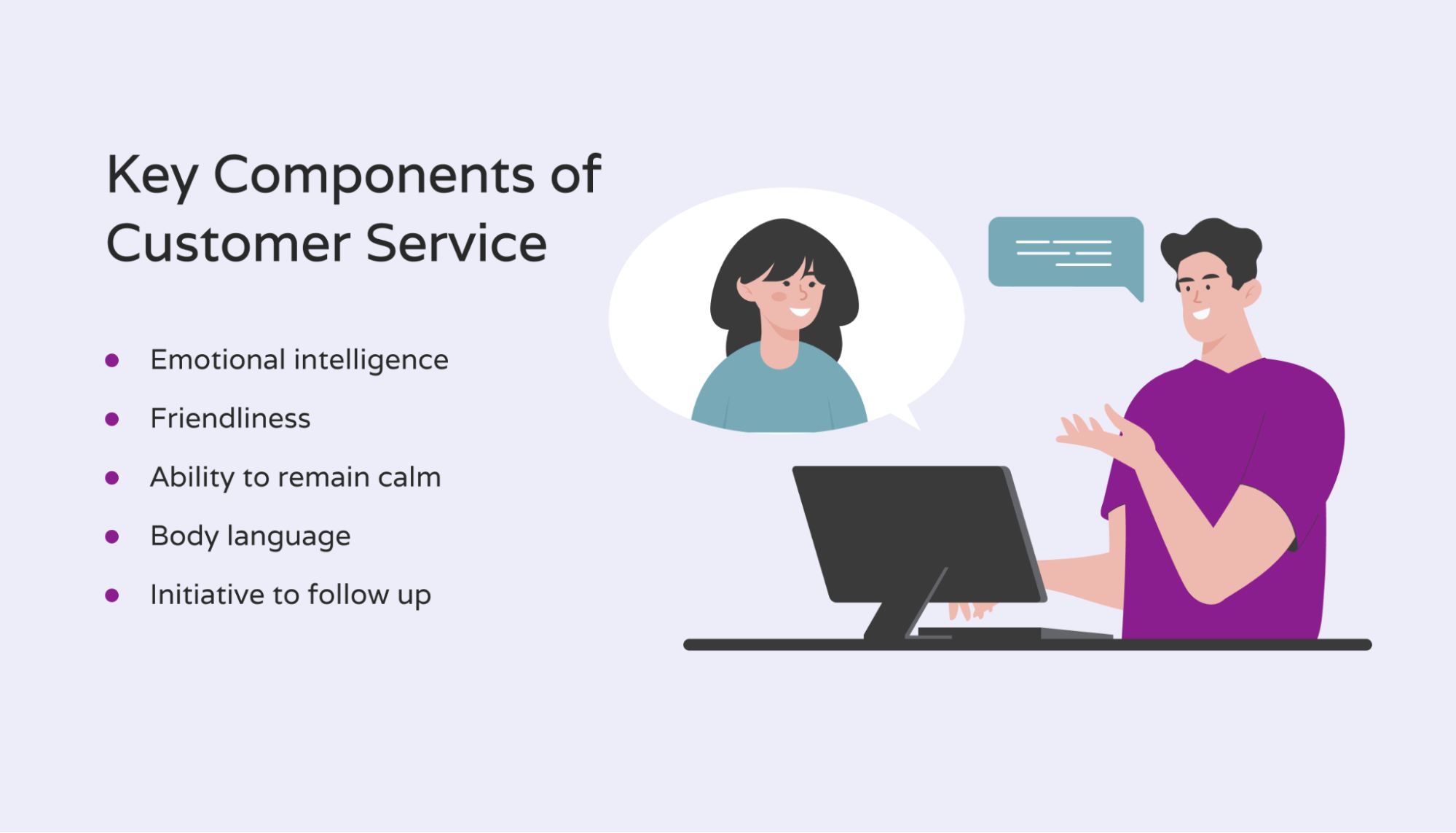
Providing great customer service means that patients will become loyal to your practice and may even refer your practice to others on social media or in person.
4. Cleanliness
Sterile equipment is a necessity in the medical field. As such, all medical assistants should know how to clean equipment effectively.
Thus, they need to know the essential steps to clean equipment, the right cleaning supplies to use, and the specific techniques they need to do the job correctly.
5. Communication skills
Medical assistants talk to customers, staff members, and suppliers daily. As such, they need to have strong communication skills — both verbal and written.
- Verbal communication skills so they can feel comfortable talking to stakeholders in person and over the phone.
- Written communication skills so they can type out professional emails, detailed documents, and other content whenever they’re required.
6. Listening skills
Assistants need to be able to listen to their employer, co-workers, and clients to follow protocols correctly. They’ll be tasked with many different duties daily. This means that they need to be able to follow instructions well (without constant micromanagement).
Their listening skills will also come in handy when they need to record notes on serious infections, diseases, and treatments so they can keep this documentation accurate.
7. Computer skills
A big part of a medical assistant’s job involves working at a computer. Whether that be typing, using spreadsheets, or working with different web browsers, they need to have technical skills and know how to use computer systems and software.
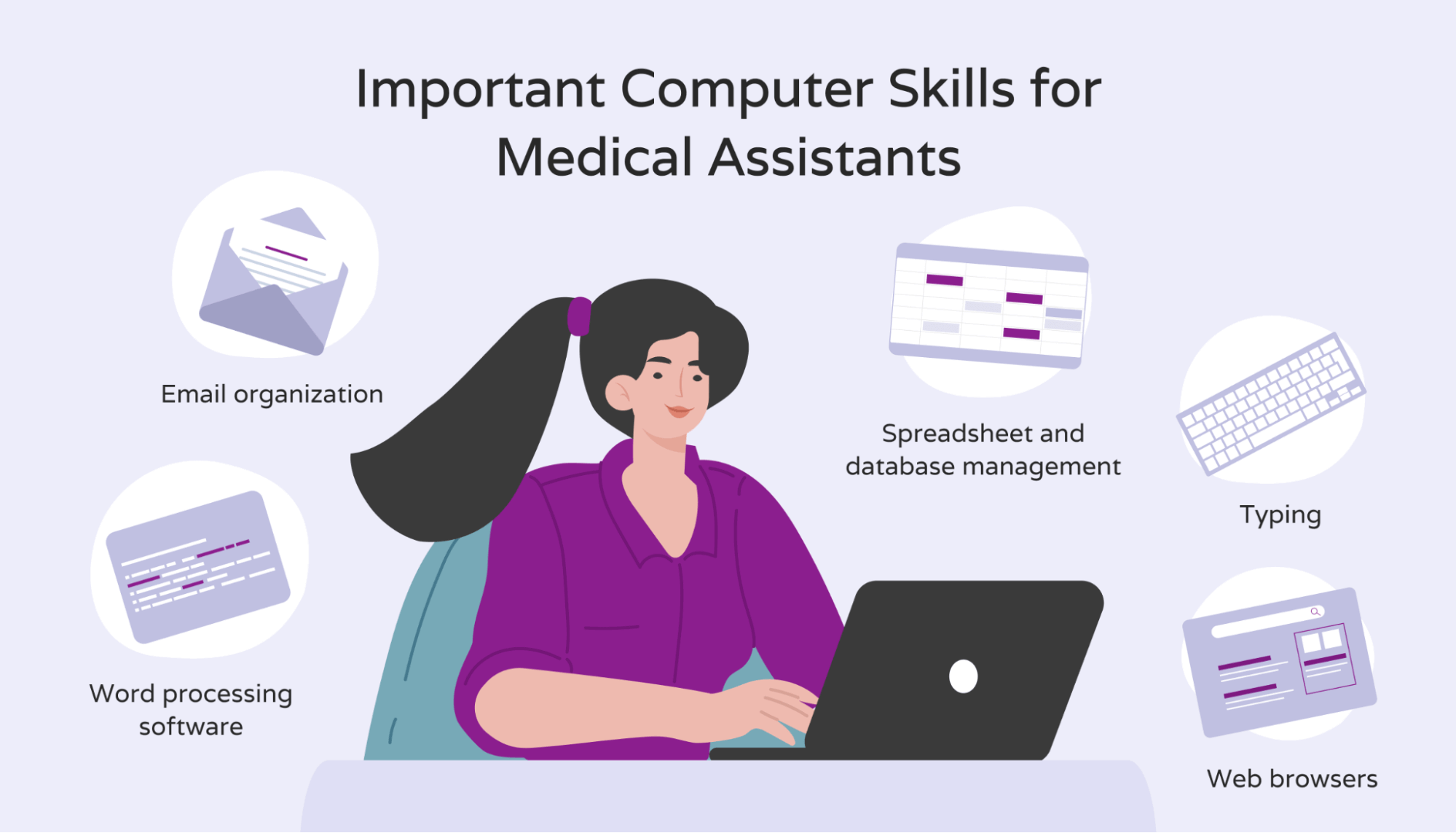
Additionally, a medical assistant should be able to learn new software quickly since their employer may use unique software systems to run their practice.
8. Attention to detail
Since they’re dealing with patients’ health and lives, it’s vital for medical practices to pay great attention to detail in everything they do. For example, during patient record-keeping, it’s crucial that the information they record is accurate.
Therefore, it’s vital that medical assistants pay attention to detail at all times. They need to be able to keep track of the different procedures that patients undergo and the treatments and medications they require.
9. Knowledge of the healthcare industry
A good medical assistant will have knowledge of medical terms and procedures. With this knowledge, they’ll be able to perform minor medical procedures, such as drawing blood, changing bandages, and cleaning wounds.
Knowing medical terminology also means that they’ll be able to record data more accurately and provide better patient aftercare based on the medical practitioner’s instructions.
10. Problem-solving skills
Problems often arise within the medical industry. Patients may experience side effects, supplies may be late, or there may be problems with payment.
Medical assistants need to have good problem-solving skills so they can handle these situations calmly. They also need to be able to work well under pressure — especially when patients or staff members are distressed.
How will hiring a medical assistant benefit your business?
Hiring a medical assistant for your business will help you in many ways. Here are some of the main advantages you can expect:
Better customer service
According to the 2022 PwC Customer Loyalty Survey, 55% of customers would leave after a few bad experiences. And 8% would leave after just one bad experience.
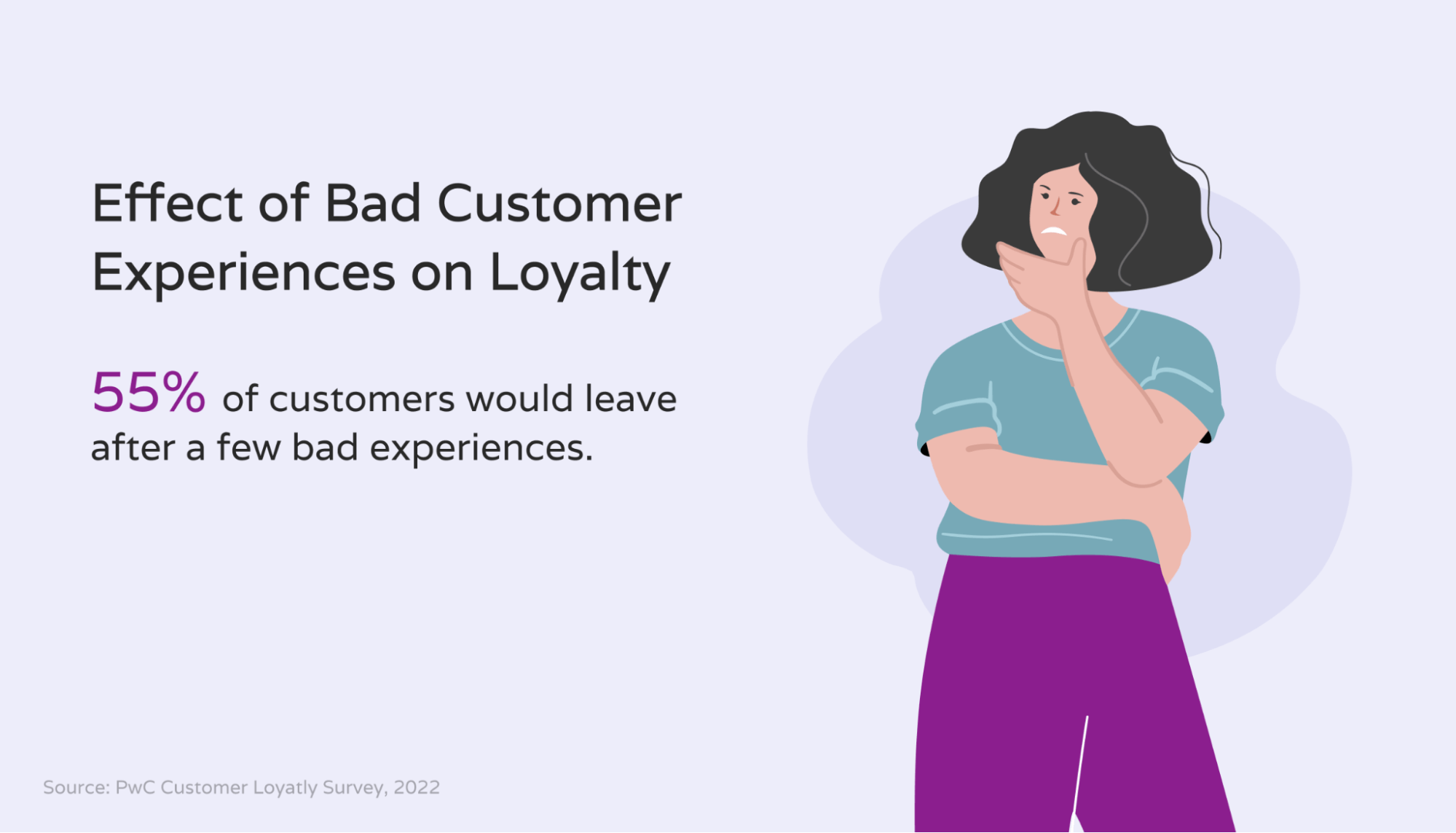
Offering patients the best possible experience will help to ensure loyalty in the long run. Having a medical assistant to take care of your patients and their needs will likely improve patient satisfaction. It may also lead to more referrals — and more profit for your business.
Save time
Since your medical assistant will take care of many mundane, daily tasks, this means that you and your other staff will have more time to focus on your own work.
You’ll have more time to spend with your patients, and your in-house staff will be able to perform high-impact tasks that affect the growth of your practice. All of this will lead to more seamless operations and higher productivity levels.
Happier employees
Having a medical assistant means that your employees will only have to focus on their own work, and they’ll likely experience burnout less often and be happier as a result. Your business will have a far better company culture and work environment.
Not only will this positively impact your business’s operations, but it’ll also reduce your employee turnover rate — saving you money on recruitment and job training.
Improved brand reputation
Having an assistant to help your patients with both big and small requests means that your patience will be happier. As a result, they may end up posting online about the amazing care they received at your practice. They may also end up giving you a five-star rating on Google.
This will help your practice build its reputation and authority within the industry.
Save money
Hiring a virtual medical assistant, as opposed to an in-office assistant, can save you money. A virtual medical assistant can handle all your administrative tasks for you but at a lower cost than an in-person assistant.
You can hire a virtual assistant from Hello Rache for just $9.50 per hour. This is significantly lower than the average $17.88 you’ll have to pay for an in-office medical assistant. Learn more about what’s included in Hello Rache’s pricing here.
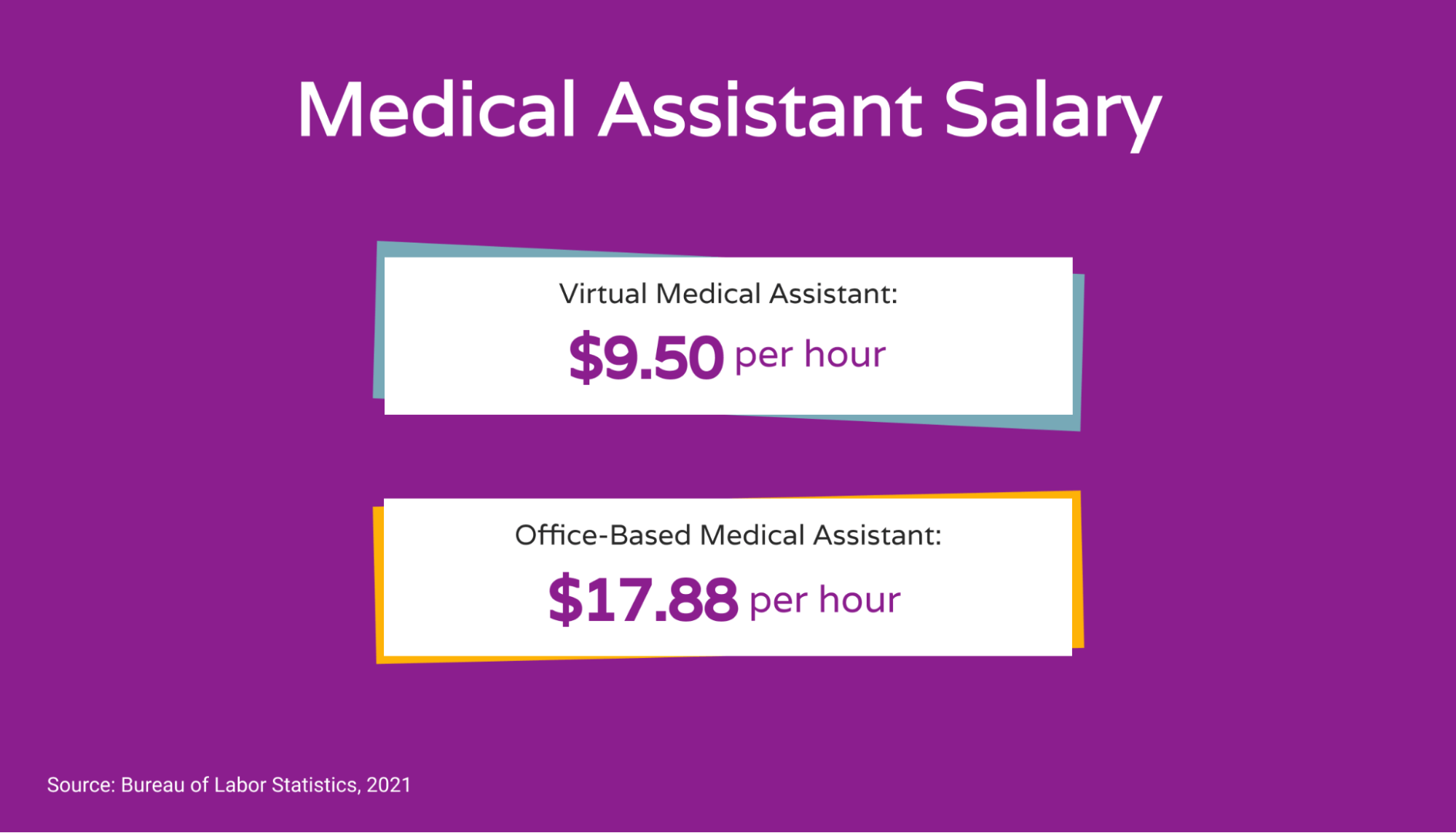
Hiring a virtual medical assistant allows you to receive many of the same services without breaking the bank!
Want to learn more about administrative medical assistant salaries? Head over to our full guide on medical assistant salaries here.
Hire a virtual medical assistant for your practice
Hiring a medical assistant will help your business achieve more overall growth. Whether you choose to hire an in-office assistant or a virtual assistant is completely up to you.
If you’re looking for someone to assist you with all your administrative tasks while providing excellent customer service, a virtual medical assistant is ideal.
Ready to hire a virtual medical assistant? Book a call with our team so we can help you find your ideal candidate.



